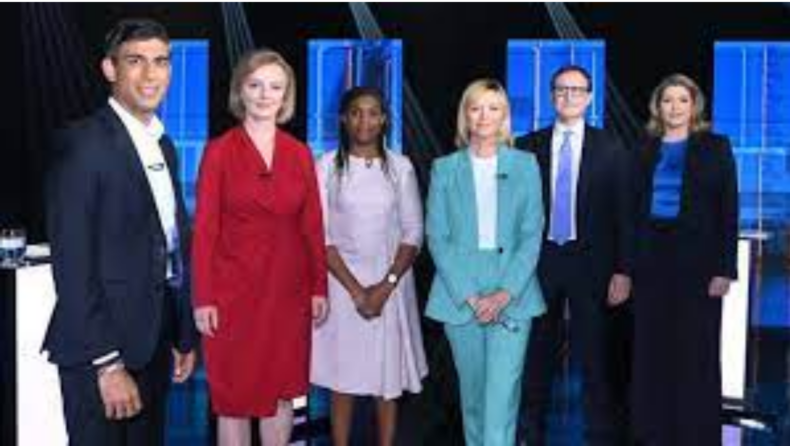Five candidates vie to become Conservative Party leader in a high-tension competition.
o The battle to become Britain’s next prime minister heats up in a televised debate on Sunday.
o Candidates looking to replace Boris Johnson clash during the leadership debate
The battle to become Britain’s next prime minister heated up over the weekend, as the candidates rallying to become Conservative Party leaders clashed in a televised debate on Sunday.
On myriad matters, those looking to replace Boris Johnson clashed at various points during the leadership debate in an interesting spectacle. The contenders openly questioned each others’ records in office, ideological ideals, and past and proposed policies.
More specifically, former Chancellor Rishi Sunak and former Foreign Secretary Liz Truss, both of whom served in Johnson’s government and are the two political powerhouses left in the race, set an argumentative tone for the debate.
Truss accused Sunak of hiking taxes to their highest level in 70 years and argued that this policy isn’t going to supplement economic growth. Sunak defended his record, claiming that the Covid pandemic had been an economic challenge and debts need to be repaid. He hit back at Truss, accusing the other of holding up a “something-for-nothing economics” which according to him, is equivalent to socialism.
The TV debate also highlighted three other candidates, former Equalities Minister Kemi Badenoch, Foreign Affairs Select Committee Chair Tom Tugendhat, and Penny Mordaunt, an international trade minister, to display their ideas on how they would lead the country if given a chance.
The debate centered around the state of the economy, the cost of living crisis, and inflation, and how each candidate would tackle these problems. Other areas of dispute included Brexit and trans rights, with Penny Mordaunt being questioned for her support for gender self-identification being the Equalities Minister in 2019.
The tax status of Sunak’s wife Akshata Murty, the wealthy daughter of an Indian billionaire, was also held up for question, as well as Sunak’s stance on Russia, with all but one stating that they would not sit next to Russian President Vladimir Putin at the G-20 meeting.
The contest comes after Prime Minister Boris Johnson resigned as party leader two weeks ago after a long-drawn controversy over his conduct while serving in office. His government has been plagued with scandals over parties during Covid-19 lockdowns and several officials have been hit with allegations of misconduct.
The final straw for many MPs was the fact that Johnson appointed Chris Pincher as a deputy chief whip, despite being aware of previous sexual misconduct allegations. It led to a barrage of resignations with ministers and officials refusing to work under Johnson. Upon being asked if they would give their former boss a ministerial job, all the candidates refused.
Showing how tight the leadership race is, a poll of 851 Conservative Party members by the website Conservative Home on Saturday put Badenoch ahead with 31% of the vote. Truss is in second place with 20%, Mordaunt dropping to third place with 18%, Sunak close behind, and Tugendhat coming in fifth.
While the poll showed who’s popular with Conservative Party members, only those candidates who gain enough votes from their colleagues will be on the final ballot to be then voted on by party members.
There had been eight candidates at the start of the race, but the numbers were reduced to the current five last week. More votes this week will see the current candidates being reduced to two, with the finalists being announced on Thursday. After that, members of the Conservative Party will go on to vote by postal ballot. The winner is expected to be September 5.













